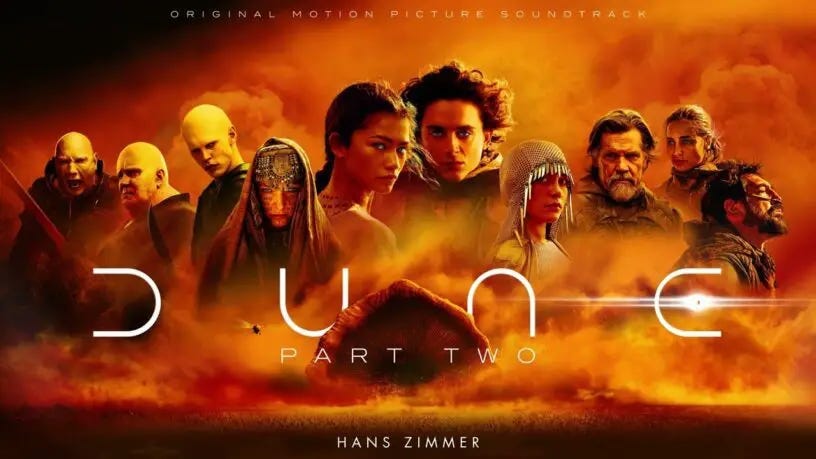Dune Part II
Looks gorgeous, but very violent. Watch it for the sand worm riding!
I don’t know how Denis Villeneuve has done it — creating incredible scenes of tangible other worlds, right down to their micro climates, weather cycles, cultures, traditions and biomes.
Less reflective and searching than Part I, this is more about who you choose to follow, what you believe and very, very Gladiatorial. I love the way that sound, switches between colour and black and white photography are used, and the immersiveness of these far flung worlds. As well the incredible gut-grabbing Hans Zimmer score. At the same time, it’s also about power grab. Paul Atreides (Timothée Chalamet) and his mother Lady Jessica (Rebecca Ferguson) are in the desert learning the ways of the Fremen. But not for long — because they have a power takeover to invoke and Arrakis to recolonise/reclaim. Who will ultimately control the spice, and the worlds, the houses, the empire?
Very soon, Lady Jessica is chosen as the new Reverend Mother and drinks a mysterious blue poison. She survives and develops the power to do ‘the voice’, as well as being able to have an ongoing conversation with her baby daughter, growing inside her. She was pregnant when she underwent the ritual — which was a mistake. Additionally she promotes the Paul as Messiah prophecy to the North and South.
Life of Brian sneaks into my brain at this point. Stilgar (Javier Bardem) wholeheartedly believes in the prophesy and in Paul as the one to fulfill this. But is he the Messiah — or a very naughty boy? Both as it turns out. We see Paul dramatically change — he may choose the name of the cute desert mouse Muad’Dib, but once he too has illegally ingested and survived the poisonous ‘Water of Life’, he goes full throttle into war. Discovering that his mother is the secret daughter of the hideous Baron Vladimir Harkonnen (Stellan Skarsgård), he embraces his inner Harkonnen, acting with viciousness and cruelty. Encouraging the Fremen to follow him or else, Paul and his mother Lady Jessica (and his unborn sister Alia, aka Anya Taylor Joy) embark on a campaign to get everyone on side. At any cost. Ironically the only one who isn’t a keen disciple is Chani, the person closest to Paul.
Princess Irulan (Florence Pugh), the Emperor Shaddam IV’s (Christopher Walken) daughter becomes a pawn in the power games. Humiliating Chani (Zendaya) in public, Paul forces a political marriage to the Princess and yet continues to look at Chani. Zendaya’s distraught face fills the screen at this point — thankfully she walks away. It’s excruciating as she has always spoken up for him, the outsider in their society; they’ve fought together and loved and respected each other. He’s learnt the ways of her society, been welcomed into it and yet been an on the edge figure of fun — only now to reject their ways, take over the leadership as a coup and dismiss her. Confusingly, he repeatedly proclaims his faithful love for her for all time — whilst not acting in line with his words. Never has a handshake been so fearsome a weapon.
Full of vengeance, Paul fights his cousin, Feyd-Rautha Harkonnen (an unrecognisable Austin Butler). The fight between them is intriguing as both are equally skilled — it’s hard to know who will triumph, or who we want to win. We’ve already seen how callous and heartless Feyd-Rautha dispatching female servants (and those who disagree with him) at will. More needs to be said about the appalling treatment of Harkonnen women (maybe servants) by their rulers. Imagine being the daughter of such a woman hating man.
Pity too Glossu Rabban Harkonnen (Dave Bautista) who tries to exercise power, but merely shouts a lot, is defeated and ignored — and is ultimately sidelined by the Baron and his murderous younger nephew.
Gaius Helen Mohiam (Charlotte Rampling) is still trying to control everyone and everything. She dispatches Lea Seydoux (Lady Margot Fenring) to seduce and test Feyd-Rautha, and get a daughter from him — a rival for Jessica’s power perhaps? Power politics seethe here.
For me, the film enthralls in its style, world building and sheer physicality. The Green Screen feels real, tactile — such as scenes where a battle ship was being blown up in the desert. The vastness of the desert contrasts with the smallness of Zendaya or Paul as they move through it or gaze into it. I struggled with the violence — a lot of stabby, slashy battle scenes, and the careless dispatching of women. The story gripped me less this time because of it. However, it was great to see Florence Pugh being given a decent role at last — as an intelligent, considered Princess.
The wonder too is in Denis Villeneuve’s use of so many starry names in unexpected and dynamic ways. Loved seeing Josh Brolin’s grizzled and heroic return as Gurney Halleck.



